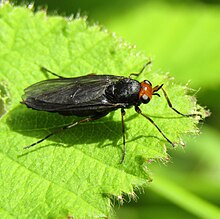Inopus rubriceps
| Inopus rubriceps | |
|---|---|

| |
| Scientific classification | |
| Domain: | Eukaryota |
| Kingdom: | Animalia |
| Phylum: | Arthropoda |
| Class: | Insecta |
| Order: | Diptera |
| Family: | Stratiomyidae |
| Subfamily: | Chiromyzinae |
| Genus: | Inopus |
| Species: | I. rubriceps
|
| Binomial name | |
| Inopus rubriceps | |
| Synonyms | |
Inopus rubriceps, known generally as the sugarcane soldier fly or Australian soldier fly, is a species of soldier fly in the family Stratiomyidae.[7] The fly acts as a host for the parasitoid wasps Neurogalesus carinatus and Neurogalesus militis.[8] The species causes damage to pasture, as well as oat and maize crops, however the degree of damage it causes means it is not considered a major pest.[8]
Though native to South East Queensland and northern New South Wales areas in Australia, its introduced range includes California and New Zealand.[9] Populations tend to prefer warm, moist climates in subtropical/tropical regions, and no related species occur in its native range, suggesting a long evolutionary history for the fly in the region.[9] The species was first recorded in New Zealand in 1944, appearing at Ōpōtiki in the Bay of Plenty in the North Island.[8]
References
[edit]- ^ a b Macquart, P.J.M. (1847). Diptères exotiques nouveaux ou peu connus. 2.e supplement. Paris: Roret. pp. 104 pp, 6 pls.
- ^ Walker, F. (1850). Diptera. Part I, pp. 1-76, pls. 1-2. In [Saunders, W. W. (ed.)], Insecta Saundersiana: or characters of undescribed insects in the collection of William Wilson Saunders, Esq., F.R.S., F.L.S., &c. Vol. 1. London: Van Voorst. p. 474.
- ^ Walker, Frances (1852). Diptera. Part III, pp. 157-252, pls. 5-6. In [Saunders, W. W. (ed.)], Insecta Saundersiana: or characters of undescribed insects in the collection of William Wilson Sauders, Esq., F.R.S., F.L.S., &c. Vol. 1. London: Van Voorst. pp. 1–474.
- ^ Hunter, W.D. (1900). "A catalogue of the Diptera of South America, Part II. -- Homodactyla and Mydiadae". Transactions of the American Entomological Society. 27: 121–155. Retrieved 30 December 2022.
- ^ White, A. (1916). "A revision of the Stratiomyidae of Australia". Proceedings of the Linnean Society of New South Wales. 41 (1): 71–100. doi:10.5962/bhl.part.15307. Retrieved 18 December 2022.
- ^ a b Hardy, G.H. (1920). "A revision of the Chiromyzini (Diptera)". Proceedings of the Linnean Society of New South Wales. 45: 532–542. doi:10.5962/bhl.part.19559. Retrieved 19 December 2022.
- ^ Woodley, N.E. (2001). "A World Catalog of the Stratiomyidae (Diptera)". Myia. 11: 1–462. Retrieved 7 December 2022.
- ^ a b c Early, John W. (2014). "Establishment of two Neurogalesus Kieffer, 1907 species (Hymenoptera: Diapriidae: Diapriinae) in New Zealand". Records of the Auckland Museum. 49: 15–20. ISSN 1174-9202. JSTOR 43264618. Wikidata Q58629012.
- ^ a b Robertson, L. N. (1985). "BIOGEOGRAPHY OF INOPUS RUBRICEPS (MACQUART) (DIPTERA: STRATIOMYIDAE)". Austral Entomology. 24 (4): 321–325. doi:10.1111/j.1440-6055.1985.tb00251.x. S2CID 83543608.
